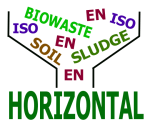In June 2002 DG Environment and JRC took to initiative to call a meeting of Member States on September 10th to seek support for the project, as it was considered of too high importance to let it die. This meeting reached a positive outcome and a number of decisions were taken, among which that the project "Horizontal" should already start in November 2002 with a literature review and desk studies on existing standards. The DG Environment and the JRC intend to contribute to the project as from 2003. In a subsequent kick-off meeting held in Ispra on October 25th, Member States were invited to make contributions. A working budget in the order of 1.5 M€ was pledged. This has resulted in the start of the project as of November 1st. Currently, the contributions from Member States and DG ENV are contractually covered. The work on organic parameters will be covered through a contract with DG RTD under the FP6 Framework (STREP call). The separate desk studies have started in February 2003 and are completed by August 31, 2003.
Objectives of HORIZONTAL
This project aims at development of horizontal and harmonised European standards in the field of sludge, soil, contaminated soil and treated biowaste to facilitate regulation of these major streams in the multiple decisions related to different uses and disposal governed by EU Directives. The revision of the Sewage Sludge Directive (86/278/EEC; draft April 2000) and the Working Document on Biowaste (draft Feb 2001) call for standards on sampling, on hygienic and biological parameters, on methods for inorganic and organic contaminants and for mechanic properties of these materials. When materials cannot be utilised, treatment or disposal becomes important, in which case leaching becomes an issue as stipulated by the Council Directive 1999/31/EC on Landfill of Waste. Part of the work will focus on co-normative work with an emphasis on horizontal standardisation starting from existing standards developed for the same parameter in the fields of sludge, soil and treated biowaste. Part of the work will focus on pre-normative research required to develop standards lacking at this point and needed in the next revision of the regulations in these fields.
